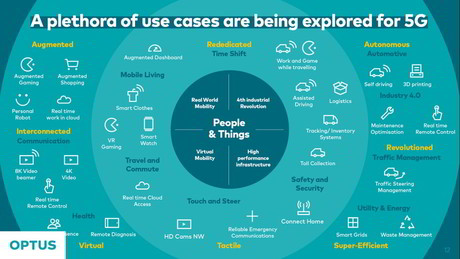Optus to roll out 5G service to rival nbn

Optus has announced plans to roll out a 5G-based fixed wireless service in metro areas, which could compete with the nbn and shake up the status quo.
The operator recently completed outdoor trials of the upcoming 5G New Radio technology, which recorded 2 Gbps download speeds using a candidate fixed wireless in-home modem device.
The trial incorporated both C-band 3.5 GHz spectrum and millimetre wave (30 to 300 GHz) spectrum, the most likely candidates for 5G.
Optus plans to hold a 5G technology showcase at the 2018 Gold Coast Commonwealth Games, before introducing a 5G fixed wireless service next year.
The showcase will preview use cases including the ability to play sports in real time in virtual reality and remotely controlling robots’ movements, Optus said.
The 5G standard has yet to be finalised by the Third Generation Partnership Project (3GPP), but most elements have been locked in place and widespread deployment is expected to commence by 2020.
“Everyone has heard of concepts like self-driving cars, smart homes, AI and virtual reality; however, their full potential will require a fast and reliable network to deliver,” Optus Managing Director of Networks Dennis Wong said.
“Seeing 5G data speeds through our trial that are up to 15x faster than current technologies allows us to show the potential of this transformative technology to support a new ecosystem of connected devices in the home, the office, the paddock and in the wider community.”
In a blog post, telecoms analyst Paul Budde said Optus is “throwing the cat among the pigeons” with its move by challenging the nbn head on.
Budde said that Optus is starting with a relatively low-speed 25 Mbps service, “indicating that it is aiming at the sweet spot in the market where 5G can compete effectively against the nbn”.
While 5G is theoretically capable of speeds many times faster than conventional mobile networks, its limiting factor will be capacity — 5G capacity needs to be split over the number of customers that are within one service area, which will dictate the performance of individual services.
“The sweet spot for 5G is indeed at the bottom end of the broadband market — the group of customers who don’t download movies every night and have relatively moderate broadband usage,” he said.
“This is where 5G will be able to deliver a similar or better performance than the nbn, theoretically at least, and at a competitive price. Optus will most certainly make this as attractive as possible by bundling 5G products with their existing mobile service.”
Meanwhile Telstra is making its own preparations for the arrival of 5G. The operator today launched a 5G Innovation Centre at the Telstra Southport exchange on the Gold Coast.
The company will use the new centre to test 5G mobile technologies prior to deployment.
Telstra has been testing 5G technology for some time, and in October completed the first 5G call with equipment vendor Ericsson. Vodafone has also been testing 5G in collaboration with Nokia.
IoT demands alternatives as 3G sunset looms
The impending 3G shutdown is a daunting prospect for organisations across ANZ that rely on...
Broadband measurement shows online gaming stacks up
The ACCC's latest Measuring Broadband Australia report has found that consumer connections to...
BlackBerry stopping one cyber attack per minute
A new report from BlackBerry's Threat Research and Intelligence team highlights the...




